- Homepage
- Our green garden
- Broad Beans
Broad beans
Broad beans was first published in the local newspaper in a column about our green home.
Sugar beans are a major source of protein for many South Africans, especially the poor and vegetarians; however there are problems. The price has increased sharply, in part because of the drought.
The price
of seed of new varieties has shot up since major agricultural companies have
become involved with new hybrids; they are reportedly more resistant to
mildew and other pests that have caused poor yields.
Retail prices increased by over 70 percent in the first six months of 2019.
This page was updated on 8th August, 2025.
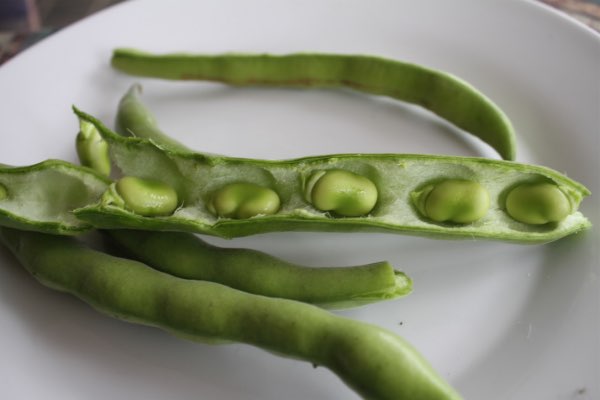
Fibre in broad beans
Beans in general have large amounts of soluble fibre making them the perfect food for those who suffer from raised blood glucose; that is a huge problem in South Africa.
By forming a gel in the gut they slow down the rapid absorption of the starch in refined carbohydrates like white rice that we as a nation have come to love. Understanding a little about what is a dietary fiber is important for all of us who get most of our food from the supermarket.
It's a gem for those suffering from constipation too.
Beans for diabetes
Contrary to their name, sugar-beans are the perfect food for diabetics; but that increase in price has put a brake on sales.
There
is an alternative; fava beans, as they are sometimes called, have an
even greater proportion of protein; in fact, at 25 percent, the highest
of all legumes bar soy.
They are simple to grow and go on bearing for months. Autumn is the best time to plant them in South Africa; they get a fungus called chocolate spot disease[2] in warm, humid weather. Using plenty of wood ash in the soil when you plant apparently helps make them more resistant; your local pizzeria will bless you if you take away their burned coals.
Broad beans
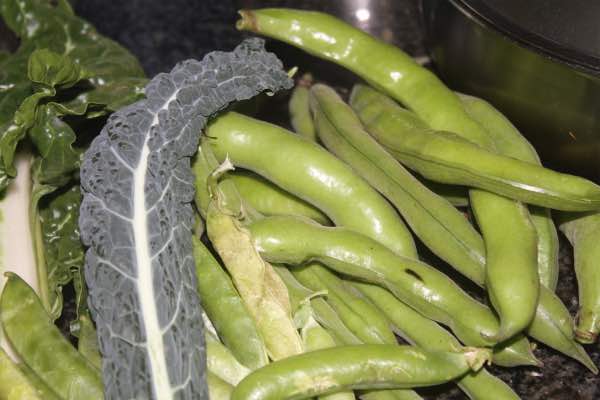 Supper fit for a king; not seen are the eggs, peppadews and tumeric.
Supper fit for a king; not seen are the eggs, peppadews and tumeric.The only natural source of dopamine
Broad beans are the second richest source of plant protein and one of the few "natural springs" of L-dopa for those suffering from Parkinson's disease; those who are looking for an alternative to drugs for their medication need seek no farther.
They are also the only legume reputed to be a complete protein; they have all the essential amino acids.
The catch though is that fresh young broad beans are almost impossible to buy in most places; you have to grow them yourself. You are unlikely to find them in the supermarket.
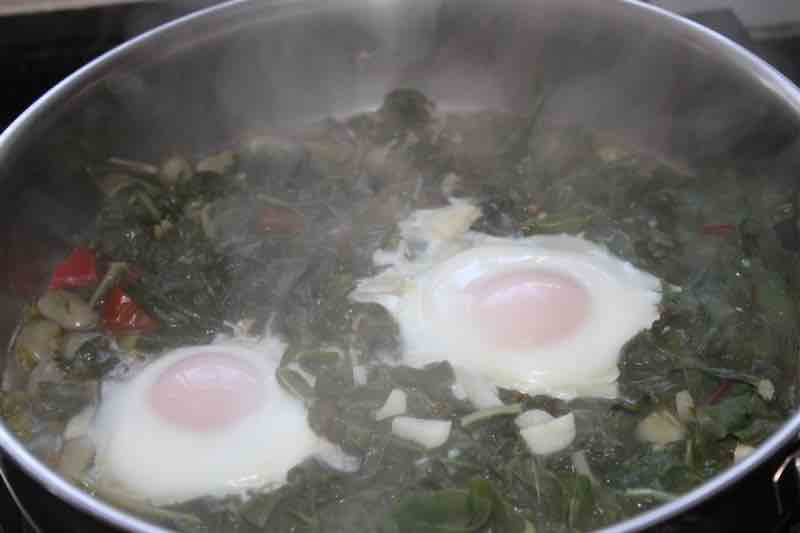 Can you see the "little grey ticks?"
Can you see the "little grey ticks?"Grow them yourself
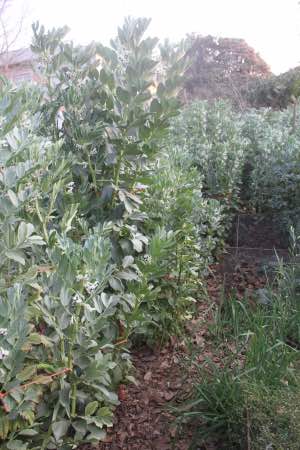 These broad bean plants are over 7' tall
These broad bean plants are over 7' tallThe seed is relatively expensive too; but if you keep back a few pods at the end of the season from chocolate spot-free plants, they will grow readily next year. The Sunrise cultivar is best all round.
We have found that our own seed germinates far better for some reason than that bought from the local nursery. It should be soaked between damp sheets of paper for a few days before planting.
Favas as far as we can tell seem to be less prone to the fungal diseases of sugar beans; the black aphids love them though.
Use soapy grey water from the washing machine to asphyxiate but not poison the aphids; it needs to be applied two or three times.
Broad bean pests
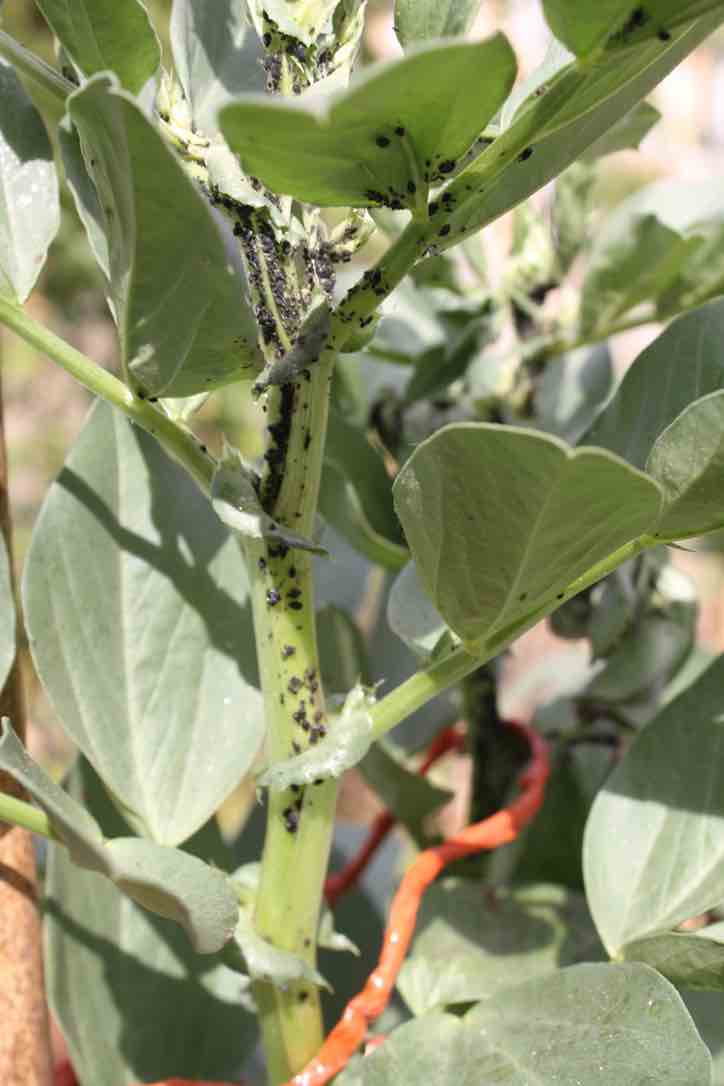 Soapy water is all that is needed to asphyxiate the black fly
Soapy water is all that is needed to asphyxiate the black flyThe material expressed on this page is gleaned from the nutritional and environmental literature; it is clearly referenced. A plain distinction is made between the author's opinion and that which is scientifically proven. When in doubt consult your health professional.
To suggest a correction or clarification, write to Dr Bernard Preston here. Contact.
We have had minimal problems with rust. There is absolutely no need to spray them with noxious chemicals as is
required with sugar beans, making them doubly perfect for the green
garden.
Soil should not be heavily fertilised as legumes capture
nitrogen from the atmosphere for the soil; they are the perfect crop to follow maize, for
example. In our case the hens have picked the area between the mealies
clean leaving their droppings. Together with ordinary compost and wood ash that is
more than sufficient.
They will need to be watered through the winter; they have a shallow rooting system. The hens show no interest in the plants as they certainly do with green beans.
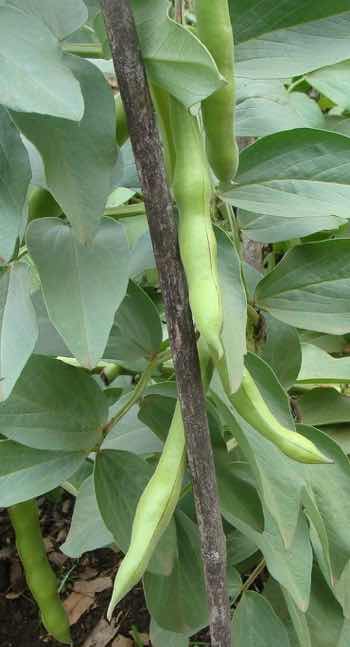
They need to be supported; a simple frame of treated wattle poles or 8mm round bar is perfect, lasting for years. A stout bamboo stake pressed deep in the ground is also fine; they need to be tied with twine.
Parkinson's Disease
Broad beans are unique in one other important way; they are the only natural source of a phytochemical that is the precursor to dopamine.
Preliminary investigations published in the Journal of Clinical &
Diagnostic Research suggest that broad beans have tremendous
applications in the prevention and treatment of highly prevalent
Parkinson’s disease, neoplasms and cardiovascular conditions[1]; and wet macular degeneration.
Harvest your broad beans when they are still relatively young; like most vegetables they are not very nice once they are old. We have not tried drying them but I am sure one could make them available throughout the year. Better still is that they can be easily blanched and frozen; they will grow in the summer with a little encouragement too.
Dried beans have far higher levels of lectins; controversially there is a body of opinion, misguided in my opinion, that we should avoid all those foods. They are much nicer if picked when young and green in any case.
Our plan was to use any excess as a substitute for laying mash for the hens but that has proved too time-consuming; podding is a chore.
Don't eat them raw
Broad beans and legumes in general but grains and other foods too have what is known as a trypsin inhibitor[3]. It's quite complicated science and not relevant here but eaten raw, they can apparently cause pancreatitis.
Having said that I'm told the Spaniards love them raw.
Cook them unless they are very young; it deactivates most of the inhibitor. Read more at the nutritional profile of broad beans.
Try this broad bean bruschetta if you ever decide to grow them; simple and delicious.
Blue Zones and broad beans
A Blue Zone toast from Sardinia:
"May you live to be a hundred."
Response:
"And may you be here to count the years."
The five Blue Zones of the world are regions identified where living to a hundred is not all that unusual. Researcher Dan Buettner found an unexpected commonality; many people continued gardening right into very old age.
What's more broad beans specifically get a mention, probably because of the dopamine that provides so much for our mental well-being. They are grown and enjoyed in all five blue zones.
Read more about blue zones at gardening could be the hobby that helps you live to 100.
This is the story of my own journey with broad beans.
"In Ikaria, a small island in the Aegean Sea, one of five blue zones countries dementia is virtually non-existent."
- Neurotrack
Read more about the Blue Zones at gardening could be the hobby that helps you live to 100.
This is the story of my own journey with broad beans and an irritating tremor in my right hand.
- Levodopa from fava beans is well researched in the J of Clinical and Diagnostic research.
- Broad bean pests
- Trypsin inhibitors of broad bean (Vicia faba L.)
- A review of nutritional profile and processing of faba bean
- Fava Beans, Dopamine, Depression; and Parkinson Disease
When browsing use right click and "Open Link in New Tab" or you may get a bad gateway signal.
Newsletter
Our newsletter is entitled "create a cyan zone" at your home, preserving both yourself and Mother Earth for future generations; and the family too, of course. We promise not to spam you with daily emails promoting various products. You may get an occasional nudge to buy one of my books.
Here are the back issues.
- Lifestyle and ideal body weight
- What are ultra-processed foods?
- Investing in long-term health
- Diseases from plastic exposure
- Intensive lifestyle management for obesity has limited value
- A world largely devoid of Parkinson's Disease
- The impact of friendly bacteria in the tum on the prevention of cancer
- There's a hole in the bucket
- Everyone is talking about weight loss drugs
- Pull the sweet tooth
- If you suffer from heartburn plant a susu
- Refined maize meal and stunting
- Should agriculture and industry get priority for water and electricity?
- Nature is calling
- Mill your own flour
- Bake your own sourdough bread
- Microplastics from our water
- Alternative types of water storage
- Wear your clothes out
- Comfort foods
- Create a bee-friendly environment
- Go to bed slightly hungry
- Keep bees
- Blue zone folk are religious
- Reduce plastic waste
- Family is important
- What can go in compost?
- Grow broad beans for longevity
- Harvest and store sunshine
- Blue zone exercise
- Harvest and store your rainwater
- Create a cyan zone at your home
Did you find this page interesting? How about forwarding it to a friendly book or food junkie? Better still, a social media tick would help.
- Homepage
- Our green garden
- Broad Beans
Address:
56 Groenekloof Rd,
Hilton, KZN
South Africa
Website:
https://www.bernard-preston.com